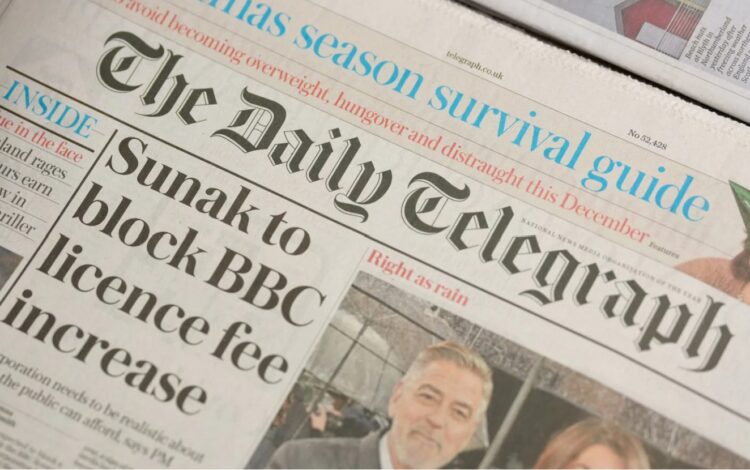The Abu Dhabi-backed investment fund RedBird IMI has formally abandoned its attempted takeover of the Telegraph Media Group, and confirmed it will seek an onward sale via an open auction (Spectator, Telegraph).
It said it had secured agreement from the Department of Culture, Media and Sport to sell on the option to own the titles in a process that will be run by the advisory firms Raine of New York and Robey Warshaw, based in London.
The formal withdrawal means that the Government may not be required to publish the results of investigations of RedBird IMI, which were focused on its potential threat to press freedom. Officials had been concerned that the investigation could embarrass the United Arab Emirates, which provided 75pc of RedBird IMI’s £600m outlay.
News of the disposal by RedBird IMI comes after a landmark ruling for press freedom in Britain earlier this year, when the UK government brought forward an amendment to the Digital Markets, Competition and Consumers Bill aimed at preventing foreign state control of national newspapers and news magazines. The House of Lords voted through the amended legislation, which effectively scuppered the controversial sale of the Telegraph Media Group to a United Arab Emirates (UAE) backed consortium.
The FSU lobbied behind the scenes to block this sale, working with peers to put pressure on the government, and we’re pleased to have played a part in this decision. Freedom of the press must always be defended.
RedBird IMI – an investment fund 75 per cent backed by Sheikh Mansour bin Zayed Al Nahyan, the UAE’s vice-president and owner of Manchester City Football Club – had been seeking to acquire the Daily Telegraph, Sunday Telegraph and the Spectator. However, the planned takeover was fiercely opposed by MPs, peers and journalists from across the political spectrum, who raised concerns about the Gulf state’s record on press freedom.
The UAE currently ranks 145th out of 180 countries included in the World Press Freedom Index. Campaign group Reporters Without Borders (RSF), which compiles the Index, says the country’s government “prevents both local and foreign independent media outlets from thriving by tracking down and persecuting dissenting voices”.
RSF’s “country fact-file” also notes that the UAE’s ‘National Media Council’ censors content that criticises government decisions, while “examining and sanctioning foreign media content, which is subject to national standards”.
Prior to the government’s announcement, peers had been set to debate an amendment to the third reading of the Digital Markets, Competition and Consumers Bill, which is currently making its way through Parliament.
The amendment was laid by Tory backbench peer Baroness Stowell as an attempt to prevent such takeovers by foreign states. In a letter to the Prime Minister, she said: “The principle of our news media being free from government control or interference is in jeopardy” and vowed that if he did not support her amendment, which would grant Parliament a veto over any sale to a foreign state, she would force a vote on it to show the strength of feeling in the Lords.
If, as seems likely, the amendment had passed there, the Bill would have returned to the Commons, where close to 150 Tory MPs were willing to push the amended version through with the help of the Labour Party, which had already made clear its view that governments cannot own publications.
Facing possible defeat on the amendment, media minister Lord Parkinson announced during a debate on the bill that the government would put forward its own amendment to prevent “newspaper and periodical news magazine mergers involving ownership, influence or control by foreign states”. This prompted Baroness Stowell to withdraw her amendment.
Lord Parkinson told the chamber that under the new measures, the Culture Secretary “would be obliged to refer media merger cases to the Competition and Markets Authority (CMA) through a new foreign state intervention notice if she has reasonable grounds to believe that a merger involving a UK newspaper or magazine has given or would give a foreign state – or a body connected to a foreign state – ownership, influence or control”.
The CMA would then “be obliged to investigate the possible merger and, if it concluded that the merger has resulted or would result in foreign state ownership, influence or control over a newspaper enterprise”, the Culture Secretary “would be required by statute to make an order blocking or unwinding the merger”, he said.
Lord Parkinson also indicated that the changes to primary legislation proposed by the government’s amendment would still apply to the Telegraph Media Group takeover if they passed into law swiftly.
Could the Emirati government get around this, and still buy ‘influence’ by reducing their stake or purchasing the Telegraph Media Group with non-voting (i.e., no control) shares as opposed to ordinary shares?
The government were alive to this risk, and as Fraser Nelson points out for the Spectator, the media minister, Julia Lopez, actually delivered an amendment even stronger than that which the rebels asked for. Whereas the original demand was for parliament to have the right to approve any foreign power ownership of the press, Lopez went one better and banned this outright.
The Lopez amendment also updates the definition of a ‘foreign power’, to counter the rise of disguised influence. For example, RedBird had said that IMI was not the UAE government, but a private fund that just happens to be run by the Emirati vice-president.
The upshot of the government’s amendment is that any “material influence” has now been banned, which means neither the UAE or any ‘foreign power’ will be allowed so much as a 0.1% stake in The Spectator, Daily Telegraph or any similar publication.
JOIN THE FSU!






